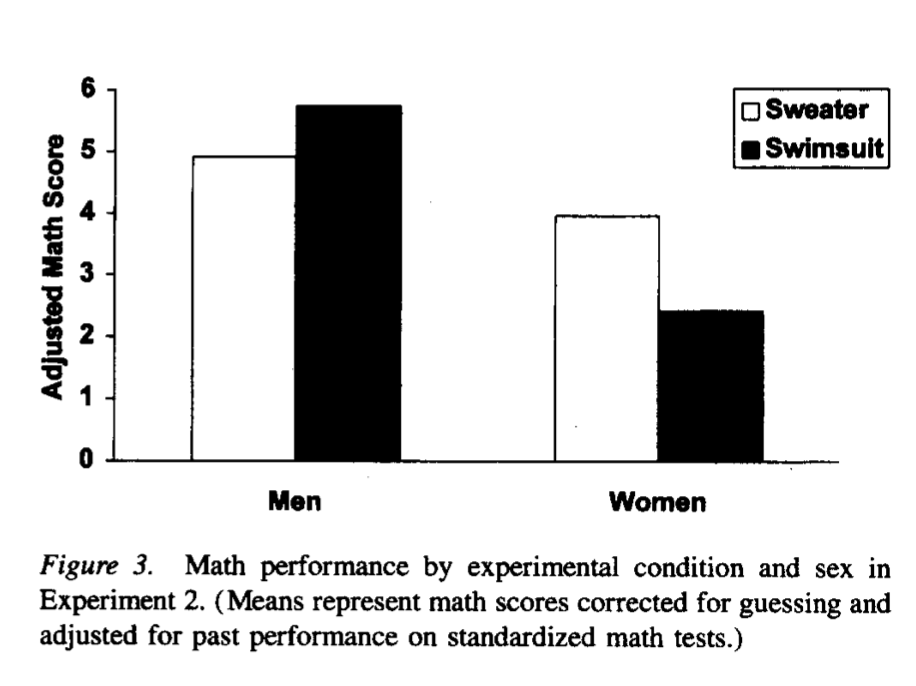September 18, 2023
Alexis Goodman
Part 2 of 2
It was 1998 when the study made its first appearance in writing. It debuted in the Journal of Personality and Social Psychology and caught attention with its intriguing title, “That Swimsuit Becomes You: Sex Differences in Self-Objectification, Restrained Eating, and Math Performance”. Four women had come together to create a unique experiment featuring both male and female participants—in swimsuits and sweaters.
Forty men and forty-two women from the University of Michigan were presented with one of two options in a dressing room by themselves: a bulky sweater or a swimsuit. Whichever clothing item they received, a facilitator asked the student to try on the article and then enter a window-less room, with no spectators, and perform a math test.
What were the results of this experiment and what was the purpose?
The men wearing swimming trunks found the whole ordeal to be quite silly, and laughter could be heard from the testing room as they answered math questions. The study reported the experience left them feeling, “shy and silly”.
As for the women, their reactions were markedly different. While the men might have seen the situation as light-hearted, the women, “felt more disgusted and angry in addition to ashamed of their bodies in the same situation.” So, how did they score on the math test in relation to their male equivalents?

This experiment showed that the women asked to take the math test in only a one-piece swimsuit performed poorly against women asked to wear the sweater, and in relation to the male participants, even worse. These results were synonymous with the authors, “prediction that self-objectification consumes mental resources,” and their belief of, “Those wearing the swimsuit, we would argue, face the added burdens associated with self-objectification, and it is these added burdens that account for their more extreme deficits in performance.”
The purpose of the experiment was to prove this: “Sexual objectification promotes self-objectification”. When girls and women are hyper sexualized, they will begin to objectify themselves, and as the study puts it, “repeated exposure to the array of external pressures to enhance physical beauty could effectively socialize girls and women to experience their attentiveness to appearance as self-chosen or even natural.” (Emphasis added)
Right there is key to this two-part series covering the phenomenon of OnlyFans. While these girls argue their choice to undress themselves for money is completely theirs and liberating, they don’t realize it’s a choice that has been pushed on them from an early age, and it does not help them in the long run.
What hyper-sexualization of girls looks like
Our culture, especially here in the U.S., sexualizes its female population from the time they can walk. A Task Force on the Sexualization of Girls (TFSG) was formed by the American Psychological Association in 2007, and since then, they have made various reports covering the sexualization of our daughters. They pinpoint sexualization occurring when any of the four happen:
- “a person’s value comes only from his or her sexual appeal or behavior, to the exclusion of other characteristics;
- a person is held to a standard that equates physical attractiveness (narrowly defined) with being sexy;
- a person is sexually objectified—that is, made into a thing for others’ sexual use, rather than seen as a person with the capacity for independent action and decision making; and/or
- sexuality is inappropriately imposed upon a person.”
I would say the ‘sex work’ performed on OnlyFans would fill at least three of the four listed above.
Their report also agreed with the swimsuit study when it said in eerily similar words, “But when children are imbued with adult sexuality, it is often imposed upon them rather than chosen by them.” (Emphasis added) They then listed three spheres wherein they find girls to be most sexualized:
- Societal contributions– cultural norms and expectations prevalent in society and permeated through media
- Interpersonal contributions– family and peers
- Self-sexualization– girls will internalize the approved standards for beauty and ‘sexiness’ they see radiating from society and inflict it upon themselves
From the media, the music industry, television, the clothes marketed to young girls, and even the scantily clad barbie dolls put on the shelves under the label of a ‘toy’, girls are taught that their bodies are sexual in purpose.
In this report they explored a study analyzing diaries of adolescent girls from the last hundred years to dissect the ways in which girls talked about self-improvement. They found, “Whereas girls of earlier eras focused on improving their studies and becoming more well-mannered, in the last 20 years that Brumberg studied, girls almost exclusively described changing their bodies and enhancing their physical appearance as the focus of their self-improvement.”
This falls directly in line with the observances made by author Ariel Levy, “We are gradually penetrating the highest levels of the work force. We get to go to college and play sports and be secretary of state. But to look around, you’d think all any of us [girls] want to do is rip off our clothes and shake it.”
The consequences OnlyFans girls are facing
We are told innovations like OnlyFans is liberating and empowering for the female population. But what does it mean to empower? The official definition is,
“make (someone) stronger and more confident, especially in controlling their life and claiming their rights”
Would you say it is empowering when an abuser tells his victim she can slap herself before he does it? Or when a farmer teaches his cattle to slaughter themselves? No, you wouldn’t. Because neither of those encouragements benefits the receiver.
It can only be empowering when the ‘someone’ is left stronger and more confident.
A plethora of research shows the sexualization of women is actually quite harmful for them. As the swimsuit study showed, it reduces mental faculties. And the report from the TFSG probes deeply into the effects sexualization has on girls and women. They show it has been, “linked directly to diminished sexual health among adolescent girls”, “associated with negative mental health outcomes in adolescent girls”, “eating disorders”, “appearance anxiety”, “serves to limit their physical activity”, and “perhaps the most insidious consequence of self-objectification is that it fragments consciousness”.
In a study analyzing “raunch culture”, and the apps like OnlyFans permeating from it, 199 participants made up of young Midwestern university students were measured on their acceptance towards the sexualization of women in the U.S. and then their level of depression and anxiety. The results? Girls who endorse raunch culture more also present with higher levels of depression.
The pornographic infiltration into daily life has sired an entire generation of women who find such a movement to be liberating, and they don’t stop there. No, through OnlyFans they can also quite easily participate in it.
This study also commented, “Thus, raunch culture may be seen as the dominant culture for most women of this current era, which may make them believe sexualized self-objectification is empowering, generating the belief that their conformity to these new societal norms is a choice.” (Emphasis added)
Self-sexualization of women is not the empowering move we think it is
Leonard Sax, in his book, “Girls on The Edge”, wrote, “Sexuality is good, but sexualization is bad. Sexuality is about your identity as a woman or man, about feeling sexual. That’s a healthy part of being human, a healthy part of becoming an adult. But sexualization is about being an object for the pleasure of others, about being on display for others. Sexuality is about who you are. Sexualization is about how you look.”
OnlyFans, time and time again, is only interested in how a woman’s body looks and performs. Nearly 70% of the subscribers are male and married, whereas 70% of OnlyFans creators are women. Those subscribers, paying up to $20 a month to view ready-made pornography, only see flesh and bones moving in ways that please them sexually. They do not burst through that paywall to enjoy the “liberation of women”.
Leonard Sax also drove home a point that has been circulating in my mind for quite some time now, but he articulates it beautifully, “There’s the irony. In an era that preaches gender equity, the guys have been awarded a windfall prize without lifting a finger. They can have sex not merely without marriage, but without any sort of romantic relationship.”
Trace Cyrus, an American musician, made a big splash when he posted this to Twitter:

He has since been attacked and told to “leave the girl talk to the girls”. But is he wrong? I don’t think so. I think he makes a valid point that research and social scholars also would agree with. Why do women seek for a liberation that only makes them further slaves to the male appetite for sexual appeasement? It is the most irritating and saddening paradox of this age. And our daughters will suffer because we push for it.
Read Part 1

Alexis Goodman was raised on a ranch in Dadeville, Missouri. She loves spending time with her husband, reading, hiking mountains, and learning new hobbies. She is currently a student at Brigham Young University-Idaho, where she is working to get a degree in Political Science with an emphasis on American Government.

